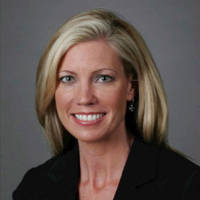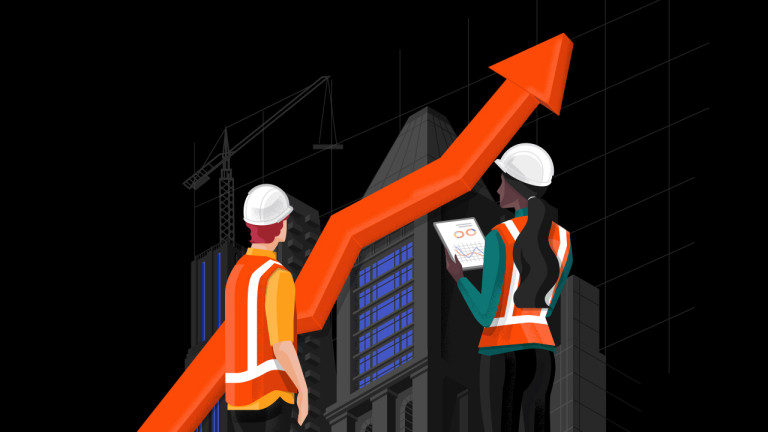Groundbreaker Profile
Kasey Bevans
Taking Construction Digital on a National Scale
“I love being in different cities where we’ve built some very iconic projects and being able to point to my family or my friends and say, ‘We built that.’ Of course, they all want to know what my part of it was. I tell them, ‘I'm the enabler. We're the ones that provide the technology that allows them to do their jobs and put up these buildings.’”

Kasey Bevans
Senior VP and CIO
Balfour Beatty
What is your origin story? What made you who you are?
I grew up in Texas my whole life—born and raised. I lived in Texas until after undergraduate school, then I went to Madison, Wisconsin for grad school. So, other than those two and a half years in Wisconsin, it has always been Texas. I think what shaped me the most was I didn't come from a family with a lot of money. I started working when I was 16, and have worked ever since. I can recall always having a job.
Working since I was 16 really embedded my relentless work ethic. I learned the real meaning of truly working hard—and as a result, getting what you want out of life. I learned to be self-sufficient and not dependent on others.
Do you remember when you first had the idea of working in technology?
In high school I was involved in sports, and to participate in sports you had to maintain your academic hours and grades. I placed out in math, so my counselor said, "Well, you should take computer courses.” My high school computer science teacher at the time, also said, "You have a niche for it and you're good at it. Just go this route until you figure it out.” So I got my undergrad degree in computer information systems. It wasn't the career path I immediately saw myself pursuing. My mom was an interior decorator. My sisters are in the fashion industry, and I think their roles are much more exciting and fun. But, I love what I do! My passion is problem-solving and I'm very analytic. I just never thought I'd be a computer geek.

What’s the story of your career? How did you get to where you are now?
After I received my undergraduate degree, I worked for Texas Instruments. I started out as a programmer and a developer, and I knew pretty quickly that I was not going to enjoy being on the technical side. So, I went to grad school and received my MBA with an emphasis in strategy. After that, I started my own consulting company. I learned there was a need out there, because a lot of CIOs at the time were very technical. Because I could speak the CIO’s language, I saw an opportunity to be a bridge—to work with CEOs and CFOs, understand their strategies, and help the CIO build a technology roadmap aligned with that.
How do you draw the line from that early consulting work to Balfour Beatty?
One of my early consulting customers was Centex. I was hired by their CEO to work with their CIO to align the company’s technology with the company’s strategy. After approximately six months of working with their CIO, they asked me, "Would you be interested in coming aboard and being our new CIO?" At the time, I wasn't really interested in going back into corporate America—I was enjoying my own consulting work too much. But I told them I would come on as their interim CIO. Of course, 19 years later I'm still here. Balfour Beatty bought Centex in 2007.
Construction’s gender bias is still something the industry is trying to address. What has your experience been in your construction career? How do you see women transforming the industry in the next 10 years?
I mean, let's not lie. The construction industry has traditionally been a male, caucasian-dominated industry. But I’m starting to see more and more focus on diversity and inclusion—construction’s serious attempts to address that reputation.
I personally came up against it when I entered the business 19 years ago, and it was challenging. It was mainly males when I began, and an older generation of males at that. But I’m now seeing more and more women breaking into this industry—and they're absolutely crushing it. Some of our excelling project managers are female. Three women sit on our executive leadership team, whereas there was only one when I started. We have more women in leadership roles, whether they're directors or managers or VPs or SVPs. It’s actually been exciting to experience how construction has embraced diversity and inclusion and the non-traditional look and feel of the industry as a whole.

If I can ask… you were talking earlier about parenthood. How might your professional role have affected your perspective on motherhood?
Of course, what mother is not going to say that's been the best part of my life? Because it has. I have two kids. I have a daughter who is a freshman in college, and a son who is a senior in high school. It’s been exciting watching them grow, develop and mature. It's also been challenging to watch them guide themselves without intervening, but instead help them find their own way forward. In the work environment it’s easier to give direction to team members and it’s well received, but at home your children don’t always agree with your advice. You’ve got to let them make their own mistakes, live with the consequences and hope they learn from it.
It's really important to me to be a good example to my children. I worked hard. I went to school. I went to grad school. And I never want to take that for granted. I want to wake up every day and have my kids look at me as a role model. I hope they follow in my footsteps by going to college to make their own choices, their own success on their own terms.
What does the term Groundbreaker mean to you? And are you a Groundbreaker?
Being a Groundbreaker means breaking into new territories. For me personally, it was joining an industry that was predominantly male-driven and an older generation of males. Women are constantly breaking new ground in the construction industry. I've been committed to finding new ways to improve this industry, focusing on a better work-life balance for our employees, and seeking innovation that lets them work more efficiently with less wasted effort and greater safety. I’m always focused on changing and bettering the experience for everyone involved—our employees, yes, but all the stakeholders, too—those we work with throughout the project life cycle.
Today we’re breaking the mold of the traditional construction industry, from the people we bring into our industry to the way we deliver a project; faster, safer, and with controllable outcomes. If I’m a Groundbreaker at all, it’s because I'm an example––an example of what can be done outside the norm.






